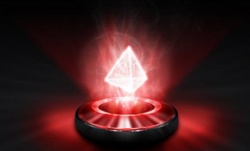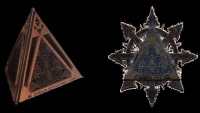
|
I see the contestants are making their way out onto the starting grid. This article was originally created as an entry for a Tenth Great Jedi War competition and is not official DJB canon content. It is preserved here for historical purposes only.
|

|
| The Keeper's Holocron
|
| General Information
|
| Model:
|
Triangle on Compass design
|
| Type:
|
Sith Holocron
|
| Culture:
|
|
| Created:
|
29 AYB
|
| Creators:
|
|
| Owners:
|
|
| Gatekeepers:
|
Sirrus impersonator
|
| Locations:
|
|
| Physical Properties
|
| Shape:
|
Pyramid
|
| Color:
|
blue and gold
|
| Length:
|
8"
|
| Width:
|
8"
|
| Height:
|
6"
|
| Protection type:
|
Insane Gatekeeper
|
| Inscriptions:
|
none
|
| Chronology & Usage
|
| Contents:
|
- Brotherhood History
- Tarentum History
- The Shroud navigation charts
- Secrets regarding the Rakghoul
- Necromancy secrets
- Knowledge of Oblivion
- Knowledge from the dead
|
| Eras:
|
Dark Jedi Brotherhood Era
|
| Affilation:
|
|
| [Source]
|
- "This has the potential to be the most powerful holocron ever created, if it weren't for that infernal gatekeeper."
- ―Rekio Corsair Tarentae
Crafted by the elders of Clan Tarentum at the darkest depths of the clan’s decent into necromancy, the Keeper’s Holocron is a rare and unique holocron. While some have argued that it is one of the most inventive holocrons , none who have used it have ever doubted that it is also one of the most troubling to use.
History
During the height of clan specific powers, the elders of Tarentum sought an easy way to store the information from their various experiments and forays into the world of necromancy. The decision was made to craft a holocron that could be utilized like a traditional holocron, but also with one rare and unique ability: the ability, within a certain amount of time, to take the memories of the recently departed. In order to create the holocron, four senior members of Tarentum came together and pooled their knowledge and resources: Sith Bloodfyre, Oberst, Rekio, and Anshar. Each was given a specific assignment:
- Rekio would forge the physical part of the holocron and the chamber within for the gatekeeper. He would then assist Bloodfyre.
- Anshar, who delved into the spiritual plane, would summon a powerful spirit to become the gatekeeper: one that would be able to take memories from the recently departed.
- Bloodfyre, the most prolific necromantic practitioner, would be responsible for forging the holocron and gatekeeper together and essentially sealing it so that it would not go out of control.
- Oberst would oversee everything and assist where needed, but also would be the one to destroy the holocron if the procedure went out of control.
The entire process was carried out in the deepest bowels of the Mystics Asylum where even the red glow of the forging process seemed to be dim and dull. Surprisingly, and unlike many other of Tarentum’s grand experiments, the creation of the holocron went exactly according to plan. However, the process did completely exhaust the participants and as they lay there resting, the first person who approached the holocron was Sirrus, the insane former Krath High Priest and the so-called “Facility Director” of the Mystic’s Asylum. Sirrus activated the newly crafted holocron and became the first to engage with the Gatekeeper.
 Sirrus, riddle speaking madman
Sirrus, riddle speaking madman. This, as it would turn out, proved to be a mistake.
Because they had not crafted a version of themselves into the holocron, instead using a spirit, the Gatekeeper had no specific personality. Upon meeting Sirrus, the spirit became a carbon copy of Sirrus, including the insanity. Sirrus then left the room without telling anyone of what had happened, leaving the creators to find out for themselves.
After the four forgers came to consciousness, they quickly realized the problem with the holocron’s gatekeeper. Nevertheless, they attempted to use it, for they had all learned how to work with Sirrus. The four quickly learned that the holocron was quite adept at retrieving the memories of the recently departed and would do so rather willingly. However, when it came time to access that information, the Gatekeeper proved a wily and troublesome adversary. Often speaking in riddles, one had to first get the Gatekeeper to acknowledge what information was desired and then to retrieve it.
In a very short amount of time, the holocron quickly became troublesome to the point where Tarentum decided they would attempt to craft another one (though to date, no one has done this). However, not wishing to completely eliminate their creation, the four creators agreed to give it to the Dark Council. Anshar, being perhaps on the best terms with Sarin, the Grand Master at the time, was the one “volunteered” to take the holocron to him.
Appearance and Materials
The basic structure of the holocron appears to be a traditional Sith Holocron, but during the forging, the colors changed and, inadvertently, the holocron melded with the design of the table underneath it, resulting in a compass design on the bottom. Both the base holocron and the final version are made of the same materials, save for the compass design on the final version. These materials include:
- Obsidian-Glass composite- The most fragile part of the holocron, this composite forms the blue part of the final model and is vaguely translucent to the naked eye
- Bronzium- Meant to serve as support and protection to the obsidian-glass composite.
- Iron- Only on the final model in the compass design, this became attached to the final design because of an iron compass inlaid into the table upon which it was crafted.
Uses and Rumors
 The original base holocron (left) and the final version (right)
The original base holocron (left) and the final version (right)
- "You need the patience of a Jedi to use it and two hands to carry it. And we're supposed to take this into battle?"
- ―Sarin, upon receipt of the holocron
There are no documented cases where the holocron has been used, save for the experimentation phases. As no written records exist, there is no easy way to know how much knowledge the holocron has already stored, or how useful that knowledge may be. Tarentum has readily acknowledged that the holocron was tested on failed apprentices as well as undead beings, such as the Aptrgangr, but beyond that, they make no mention of what, or whom, it was used upon. The riddling barriers thrown up by the pseudo-Sirrus gatekeeper do not help the situation. Another issue with the use of the device is the sheer crazy shape of it; carrying it is awkward at best and annoying at worse.
The Keeper’s Holocron has since largely disappeared from the public eye since it was turned over to the Grand Master, somewhat lending to the idea that it was meant as a practical joke. However, many know about it and speculate that the Grand Masters have kept the device to steal the memories of the Brotherhood’s greatest opponents. Some of the more paranoid members believe that it may be used on Brotherhood members who leave the organization, especially the Elders. Some rumors circulate that Sarin had it with him when he went to face Omancor Crask. Already rumors are spreading that Muz has it with him for use against his former master and Michael Halcyon after they have been slain.